
The men's pommel horse was a gymnastics event contested as part of the Gymnastics at the 1964 Summer Olympics programme at the Tokyo Metropolitan Gymnasium. The event was held on 18, 20, and 22 October. There were 128 competitors from 29 nations, with nations in the team competition having up to 6 gymnasts and other nations entering up to 3 gymnasts. The event was won by Miroslav Cerar of Yugoslavia, the nation's first medal in the pommel horse. Silver went to Shuji Tsurumi of Japan, the third man to win multiple medals in the event. Yury Tsapenko of the Soviet Union took bronze, breaking a three-Games gold medal streak for the Soviets.

The men's vault was a gymnastics event contested as part of the Gymnastics at the 1964 Summer Olympics programme at the Tokyo Metropolitan Gymnasium. The event was held on 18, 20, and 23 October. There were 130 competitors from 30 nations, with nations in the team competition having up to 6 gymnasts and other nations entering up to 3 gymnasts. For the first time in three Games, there was a clear winner with no tie. Haruhiro Yamashita took the gold medal, the second consecutive gold for Japan. Victor Lisitsky finished second, taking silver but breaking the Soviet Union's three-Games gold medal streak. Hannu Rantakari's bronze was Finland's first medal in the event since 1948.
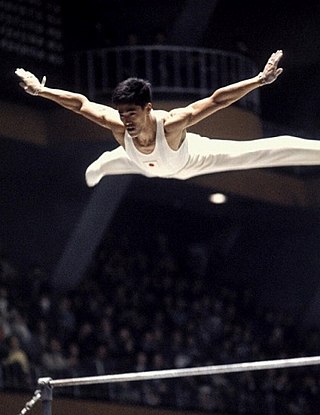
The men's parallel bars was a gymnastics event contested as part of the Gymnastics at the 1964 Summer Olympics programme at the Tokyo Metropolitan Gymnasium. The event was held on 18, 20, and 23 October. There were 128 competitors from 29 nations, with nations in the team competition having up to 6 gymnasts and other nations entering up to 3 gymnasts. The event was won by Yukio Endo of Japan, the nation's first victory in the parallel bars after two Games with silver and bronze medals. It was the first of a four-Games gold medal streak for Japanese gymnasts in the event. Japan also took silver, with Shuji Tsurumi finishing second. Bronze went to Franco Menichelli of Italy.

The men's horizontal bar was a gymnastics event contested as part of the Gymnastics at the 1964 Summer Olympics programme at the Tokyo Metropolitan Gymnasium. The event was held on 18, 20, and 23 October. There were 128 competitors from 29 nations, with nations in the team competition having up to 6 gymnasts and other nations entering up to 3 gymnasts. The event was won by Boris Shakhlin of the Soviet Union, the nation's first victory in the horizontal bar after two Games with silver and bronze medals. The Soviets also took silver, with Yuri Titov finishing second. Shakhlin and Titov were the fifth and sixth men to win multiple medals in the horizontal bar. Bronze went to Miroslav Cerar of Yugoslavia.

The men's individual all-around was a gymnastics event contested as part of the Gymnastics at the 1964 Summer Olympics programme at the Tokyo Metropolitan Gymnasium. It was held on 18 and 20 October. There were 130 competitors from 30 nations. Each nation could send a team of 6 gymnasts or up to 3 individuals. The event was won by Yukio Endō of Japan, the nation's first victory in the event after two consecutive Games with silver medals. Endō snapped the Soviet Union's three-Games gold medal streak and started a three-Games streak for Japan, as the two nations reached the height of their four-decade combined dominance of the event. Three silver medals were awarded after a tie between Viktor Lisitsky and Boris Shakhlin of the Soviet Union and Shuji Tsurumi of Japan. Shakhlin, the defending gold medalist, thus became the seventh man to win multiple medals in the all-around. For the second consecutive Games, Japan and the Soviet Union took 11 of the top 13 places.
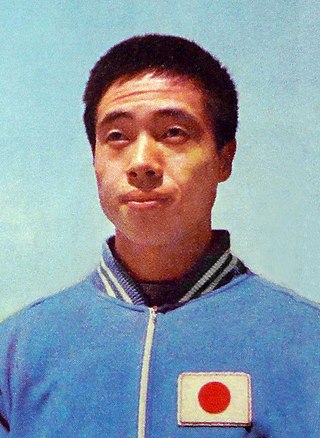
The men's parallel bars competition was one of eight events for male competitors in artistic gymnastics at the 1972 Summer Olympics in Munich. The qualification and final rounds took place on August 27, 29 and September 1 at the Olympiahalle. There were 112 competitors from 26 nations ; nations entering the team event had 6 gymnasts while other nations could have up to 3 gymnasts. Japan reached the height of its success in the event this year: putting four men into the six-man final and sweeping the medals. Sawao Kato earned Japan's third consecutive gold medal in the parallel bars, tying Switzerland for most golds all-time; Kato would break that tie in 1976 with his second gold medal. Shigeru Kasamatsu took silver while Eizo Kenmotsu earned bronze.
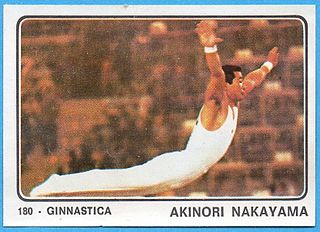
The men's rings competition was one of eight events for male competitors in artistic gymnastics at the 1972 Summer Olympics in Munich. The qualification and final rounds took place on August 27, 29 and September 1 at the Olympiahalle. There were 111 competitors from 26 nations ; nations entering the team event had 6 gymnasts while other nations could have up to 3 gymnasts. The top two places were the same as in 1968, while the next two places were taken by the same gymnasts but in the opposite order. The event was won by Akinori Nakayama of Japan, the nation's third consecutive victory in the men's rings; Nakayama was the second man to successfully defend an Olympic title in the event. Mikhail Voronin's second consecutive silver extended the Soviet Union's podium streak in the rings to six Games. Nakayama and Voronin were the fifth and sixth men to earn multiple medals in the rings. Mitsuo Tsukahara of Japan took bronze, switching places with fourth-place finisher Sawao Kato from the previous Games.

The men's vault competition was one of eight events for male competitors in artistic gymnastics at the 1976 Summer Olympics in Montreal. The qualification and final rounds took place on July 18, 20, and 23rd at the Montreal Forum. There were 90 competitors from 20 nations, with nations competing in the team event having 6 gymnasts while other nations could have up to 3 gymnasts. The event was won by Nikolai Andrianov of the Soviet Union, the nation's fifth gold medal in the men's vault; it was the seventh consecutive Games that the Soviets had a gymnast place in the top two. Andrianov became the third man to win multiple vault medals, adding to his 1972 bronze. Japan returned to the vault podium after a one-Games absence, with Mitsuo Tsukahara taking silver and Hiroshi Kajiyama bronze.

The men's horizontal bar competition was one of eight events for male competitors in artistic gymnastics at the 1976 Summer Olympics in Montreal. The qualification and final rounds took place on July 18, 20, and 23rd at the Montreal Forum. There were 90 competitors from 20 nations, with nations competing in the team event having 6 gymnasts while other nations could have up to 3 gymnasts. The event was won by Mitsuo Tsukahara of Japan, the second man to successfully defend an Olympic title in the horizontal bar. It was the third consecutive victory by a Japanese gymnast in the event, and fifth in six Games. Japan also took silver, as Eizo Kenmotsu finished second, but was prevented from repeating its 1972 podium sweep by new rules that limited nations to two gymnasts in the final. Tsukuhara and Kenmotsu were the seventh and eighth men to win multiple medals in the horizontal bar. Henri Boerio of France and Eberhard Gienger of West Germany tied for bronze, the first medal for France in the event since 1924 and first horizontal bar medal for West Germany.
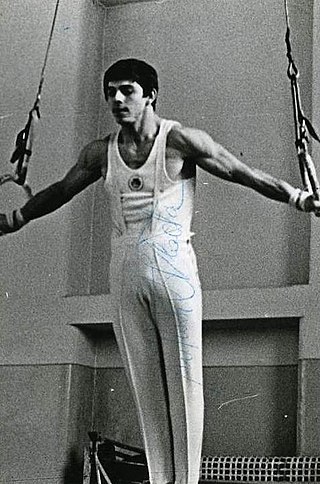
The men's rings competition was one of eight events for male competitors in artistic gymnastics at the 1976 Summer Olympics in Montreal. The qualification and final rounds took place on July 18, 20, and 23rd at the Montreal Forum. There were 90 competitors from 20 nations, with nations competing in the team event having 6 gymnasts while other nations could have up to 3 gymnasts. The event was won by Nikolai Andrianov of the Soviet Union, the nation's first victory in the rings since 1960. Another Soviet gymnast, Alexander Dityatin, took silver. The Soviet podium streak in the event reached seven Games. Dan Grecu earned Romania's first medal in the rings. Japan's three-Games gold medal streak and five-Games podium streak in the event ended as the nation's best results were fifth and sixth places.
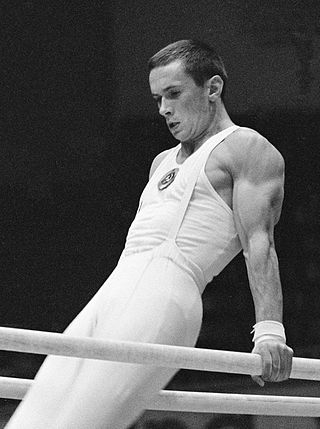
The men's horizontal bar competition was one of eight events for male competitors in artistic gymnastics at the 1968 Summer Olympics in Mexico City. The event was held on 22, 24, and 26 October. There were 115 competitors from 27 nations, with nations in the team competition having up to 6 gymnasts and other nations entering up to 3 gymnasts. The event was won in a tie between Akinori Nakayama of Japan and Mikhail Voronin of the Soviet Union. Eizo Kenmotsu of Japan took bronze.

The men's rings competition was one of eight events for male competitors in artistic gymnastics at the 1968 Summer Olympics in Mexico City. There were 117 competitors from 28 nations, with nations in the team competition having up to 6 gymnasts and other nations entering up to 3 gymnasts. The event was won by Akinori Nakayama of Japan, the nation's second consecutive victory in the rings event. Mikhail Voronin took silver to extend the Soviet Union's podium streak in the event to five Games, while Sawao Kato of Japan finished with bronze.

The men's horizontal bar competition was one of eight events for male competitors in artistic gymnastics at the 1960 Summer Olympics in Rome. It was held on 5, 7, and 10 September at the Baths of Caracalla. There were 130 competitors from 28 nations, with nations in the team competition having up to 6 gymnasts and other nations entering up to 2 gymnasts. The event was won by Takashi Ono of Japan, the nation's second consecutive victory in the men's parallel bars. Masao Takemoto gave Japan a second medal with his silver. Ono and Takemoto were the third and fourth men to win multiple medals in the parallel bars; Ono was the first to win two gold medals in the event. Boris Shakhlin of the Soviet Union took bronze.

The men's vault competition was one of eight events for male competitors in artistic gymnastics at the 1960 Summer Olympics in Rome. It was held on 5, 7, and 10 September at the Baths of Caracalla. There were 129 competitors from 28 nations, with nations in the team competition having up to 6 gymnasts and other nations entering up to 2 gymnasts. For the second straight Games, there was a tie for first place in the vault. Boris Shakhlin of the Soviet Union and Takashi Ono of Japan each received a gold medal. It was the third consecutive Games with a gold medal for the Soviets. Ono, who had taken bronze in 1952, became the second man to win multiple vault medals. Third place and the bronze medal went to Soviet Vladimir Portnoi.

The men's individual all-around competition was one of eight events for male competitors in artistic gymnastics at the 1968 Summer Olympics in Mexico City. It was held on 22 and 24 October at the Auditorio Nacional. There were 117 competitors from 28 nations. Each nation entered a team of six gymnasts or up to three individual gymnasts. The event was won by Sawao Kato of Japan, the nation's second consecutive victory in the event. Kato's teammate Akinori Nakayama took bronze. Mikhail Voronin of the Soviet Union took silver. It was the fifth consecutive Games with a Soviet gymnast on the podium in the men's all-around and the fourth consecutive Games with a Japanese gymnast there; no gymnast from any other nation medaled in the men's all-around from 1956 to 1976. In 1960 and 1964, the two nations had taken 8 of the top 10 places both Games, with Yugoslavia's Miroslav Cerar and Italy's Franco Menichelli the only two breaking up the Japanese–Soviet dominance; this time, Menichelli did not finish all exercises and Cerar was the only person from outside the Soviet Union or Japan in the top 10 as those two nations took 9 of the top 10 places in the event.
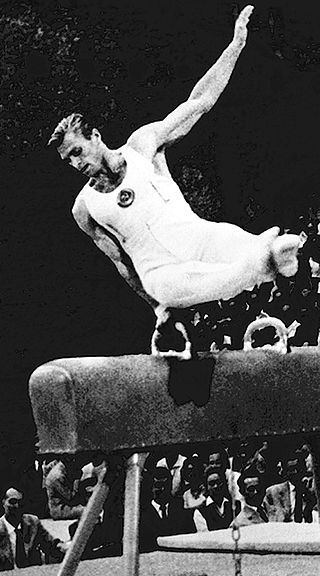
The men's pommel horse competition was one of eight events for male competitors in artistic gymnastics at the 1960 Summer Olympics in Rome. It was held on 5, 7, and 10 September at the Baths of Caracalla. There were 128 competitors from 28 nations, with nations in the team competition having up to 6 gymnasts and other nations entering up to 2 gymnasts. There was a tie for first place in the pommel horse. Boris Shakhlin of the Soviet Union and Eugen Ekman of Finland each received a gold medal. It was the third consecutive Games with a gold medal for the Soviets, as Shakhlin became the first man to successfully repeat as Olympic champion in the event. Ekman's medal was the only medal in men's artistic gymnastics in 1960 that did not go to the Soviet Union or Japan. Third place and the bronze medal went to Japan's Shuji Tsurumi.
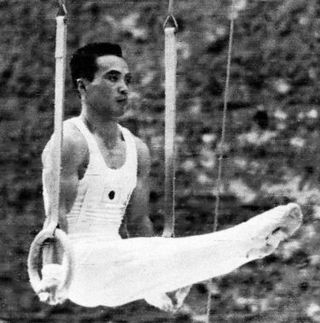
The men's rings competition was one of eight events for male competitors in artistic gymnastics at the 1960 Summer Olympics in Rome. It was held on 5, 7, and 10 September at the Baths of Caracalla. There were 129 competitors from 28 nations, with nations in the team competition having up to 6 gymnasts and other nations entering up to 2 gymnasts. The event was won by Albert Azaryan of the Soviet Union, the first man to successfully defend an Olympic title in the rings. Boris Shakhlin took silver, making it the third consecutive Games the Soviets finished in the top two. Takashi Ono tied with Velik Kapsazov for bronze, giving Japan its second consecutive Games with at least one bronze medal and Bulgaria its first medal in the rings.

The men's parallel bars competition was one of eight events for male competitors in artistic gymnastics at the 1960 Summer Olympics in Rome. It was held on 5, 7, and 10 September at the Baths of Caracalla. There were 129 competitors from 28 nations, with nations in the team competition having up to 6 gymnasts and other nations entering up to 2 gymnasts. The event was won by Boris Shakhlin of the Soviet Union, the nation's second consecutive victory in the men's parallel bars. Giovanni Carminucci earned Italy's first medal in the event since 1932 with his silver. Takashi Ono of Japan took bronze for a second consecutive Games, making him the fourth man to win multiple medals in the event.

The men's horizontal bar competition was one of eight events for male competitors in artistic gymnastics at the 1956 Summer Olympics in Melbourne. There were 63 competitors from 18 nations, with nations in the team competition having up to 6 gymnasts and other nations entering up to 3 gymnasts. The event was won by Takashi Ono of Japan, with his countryman Masao Takemoto taking bronze. Silver went to Yuri Titov of the Soviet Union. Japan and the Soviet Union each earned their first horizontal bar medals.

The men's artistic individual all-around competition at the 1960 Summer Olympics was held at the Baths of Caracalla from 5 to 7 September. It was the thirteenth appearance of the event. There were 130 competitors from 28 nations. Each nation entered a team of six gymnasts or up to two individual gymnasts. The event was won by Boris Shakhlin of the Soviet Union, the nation's third consecutive victory in the event, putting the Soviets second all-time to that point. Takashi Ono of Japan and Yuri Titov of the Soviet Union repeated as silver and bronze medalists, respectively; they were the fifth and sixth men to earn multiple medals in the event.

















